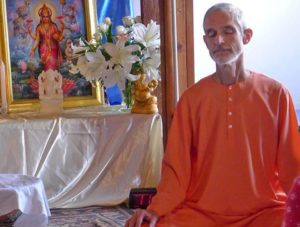Many of us may think of renunciation as a practice for monks that involves austerities and a withdrawal from worldly involvement. But the true spirit of renunciation is something every spiritual seeker must come to terms with. Letting go of worldly pursuits is not for everyone, but letting go of attachment to them is an inevitable part of the spiritual path. We decided to practice this for the month of March.
Sri Swami Satchidananda clarified renunciation by explaining that there is nothing wrong with having a nice home and all the things necessary to live comfortably and earn a livelihood. There is nothing wrong with pursuing our goals and achieving success. The problems begin when we think that all we acquire and or achieve is the source of our happiness.
But we dwell in a culture that bombards us with that very thinking and leads to a relentless effort to make happiness happen, bringing unending cycles of excitement, frustration, anger and anxiety. Practicing renunciation can be for us a conscious step toward freeing ourselves from this prison of dependence on outer conditions for peace of mind.
While we need not get rid of our possessions and goals, we can reflect on the ways that unhealthy attachment to them is creating tension and disturbance, instead of happiness. We can question the necessity of what we own and let go of accumulations that clutter our homes. We can analyze our patterns of consumption and notice when we are buying things to reward ourselves without really needing them.
Renunciation may be most potently practiced in our attitude towards our actions. Whenever we observe that we become anxious anticipating the outcome of our efforts, or angry because we didn’t succeed, we have the opportunity to see how our suffering is self created – how it is our attachment to controlling events that makes us anxious or angry. We have chance to practice being at peace with making our best effort, reminding ourselves that while the outcome is often out of our control, our peace of mind need not be.
We can examine how we rely on the admiration of others to feel good about ourselves and how we sometimes “spin” the truth to protect our reputation – another from of self-imposed dependency that compromises our values. If we truly want to our choices to be guided by a concern for the well-being of everyone and the spiritual principles we aspire to live by, we must be ready to renounce the motives of the ego-mind that always wants to know the answer, stand out and look good.
Doing so doesn’t mean sacrificing our happiness. On the contrary, when we let go of our attachment to the opinions of others and align ourselves with a higher Will, we open ourselves to Grace, to a vast source of light that can illuminate and energize our lives.
All of these efforts to practice renunciation contribute to shedding the physical, emotional and mental attachments that can unnecessarily burden our being. Embracing this intention, we can cultivate awareness of the habits and thought patterns that no longer serve us, and make a conscious choice to release them, opening the door to new ways of living that bring greater peace to the mind and joy to the heart.

